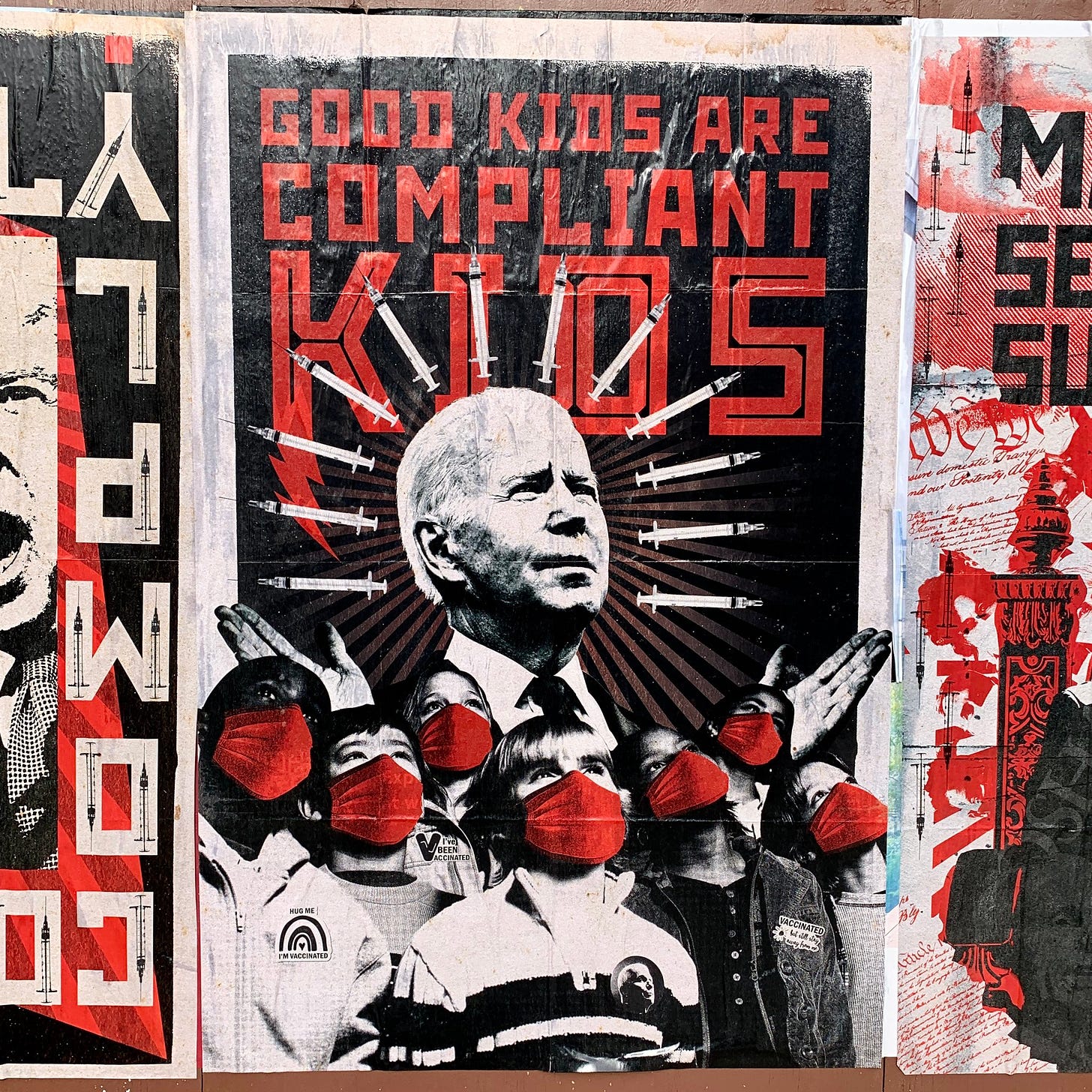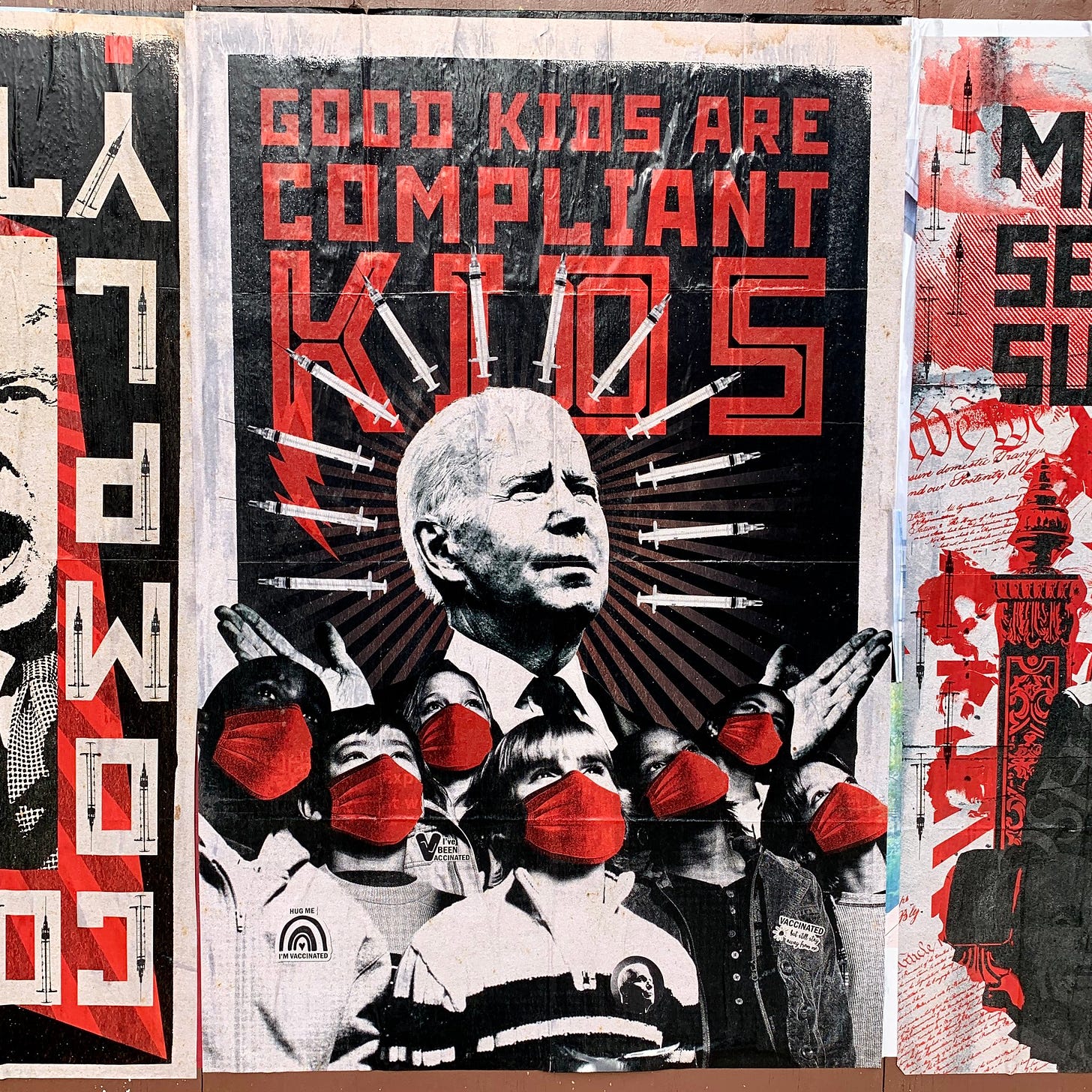
Originally published via Creed Speech Substack.
Having recently read Sasha Latypova’s piece covering John Hopkins’ latest indoctrination program for the susceptible youth, to be (mis)led about ‘long COVID’ and their role in preventing it – it seemed prudent to check in on the UNESCO site for any new educational guideline publications. [They’ve been busy].
It then seemed prudent to add a new ‘Education’ section to Creed Speech substack:

Please be patient with the cited aforementioned goals of this new Education section in also highlighting open source education resources and homeschooling ideas – the initial focus here is to deconstruct what we are up against, on a globally infiltrated level of grassroots-educational-United-Nations-driven-policy; aimed at making children into ‘change agents’ for Agenda 2030.
This new section of the Substack will soon be allocated time and energy into providing solutions-orientated alternatives to the UN-led indoctrination programs. Solutions based on open source education tools and homeschooling are key.
Before we wade through the latest 2024 publications on UNESCO’s educational guidelines manifestos – let us first begin with this document on Rethinking Learning – published in 2020 by the Mahatma Gandhi Institute of Education for Peace and Sustainable Development.
This 308 page document shall be summarised as circumspectly as possible here – and if this summary is too daunting in itself for the reader, the ‘TLDR’ is:
The warm and fuzzy language is laid on thick in the first few sections, before pouring on the stronger medicine with full on SDG indoctrination.
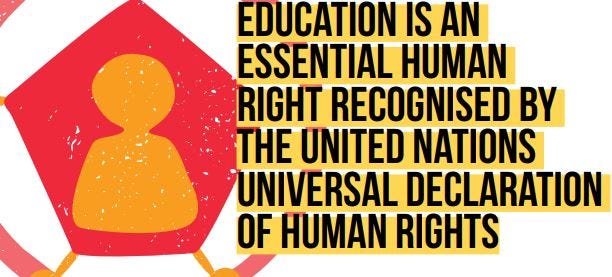
Citing lots of fluffy ‘key messages’ masks the undertones of cognitively programming the child to be receptive to end goals that are stated more clearly towards the final chapters of the report. Examples of key messages (emphasis added in bold):
Key Message 1: The key components of an SEL framework should include critical inquiry, focus attention, regulate emotion and cultivate compassionate action to produce a balance of intrapersonal, interpersonal and cognitive competencies while always ensuring that these frameworks are grounded in empirical evidence. For instance, SEL focuses on the skills that allow children to calm themselves when angry, make friends, resolve conflicts respectfully, and make ethical and safe choices.
Key Message 2: Humans are born with an innate capacity for forming social connections. Humans need social and emotional connections for learning and higher order cognition. Learning is facilitated or hindered by the social and emotional experiences of the learner. Therefore, an individual’s emotional and social development is as important as the individual’s cognitive and biological development. Education systems must be able to address and contribute to this aspect of human experience.
These key messages thus far sound innocuous enough. The desired shaping of the child’s perceived blank canvas mind is then hinted at with malleability and human flourishing.

The authors’ writing style in the report appears to be cautious in not pushing the SDGs too fast, too soon – with most of the more overtly stated education 2030 aims inserted in the latter sections of the document.
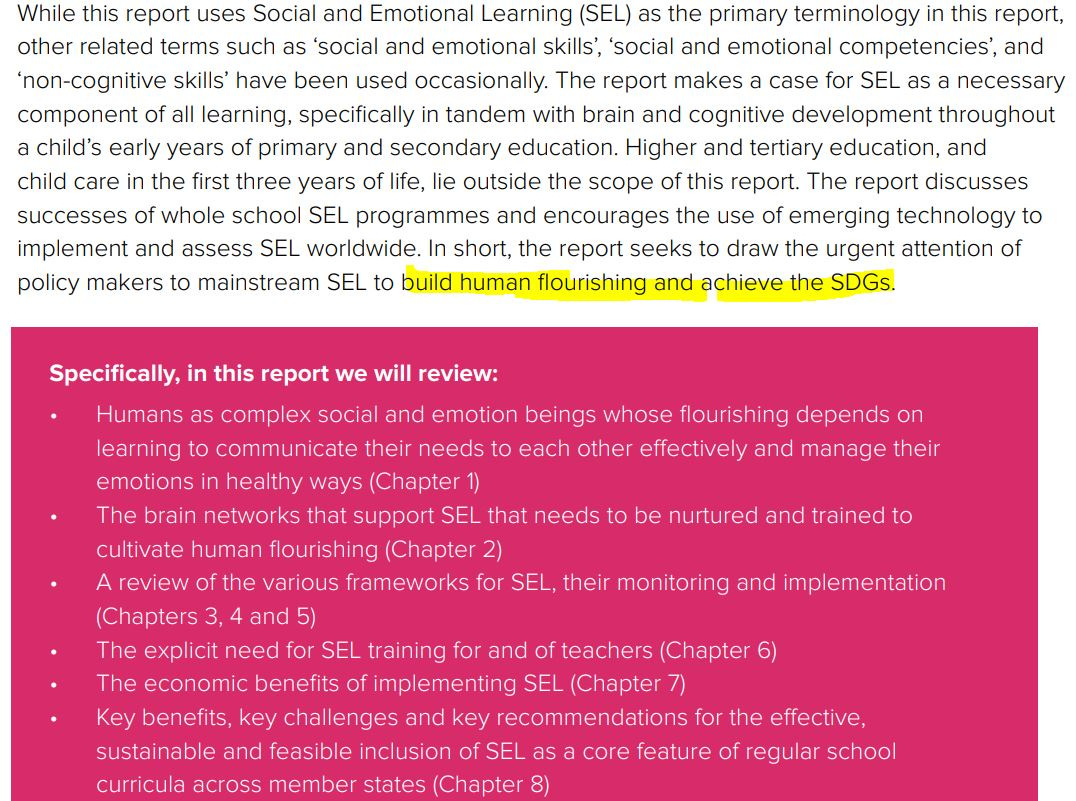
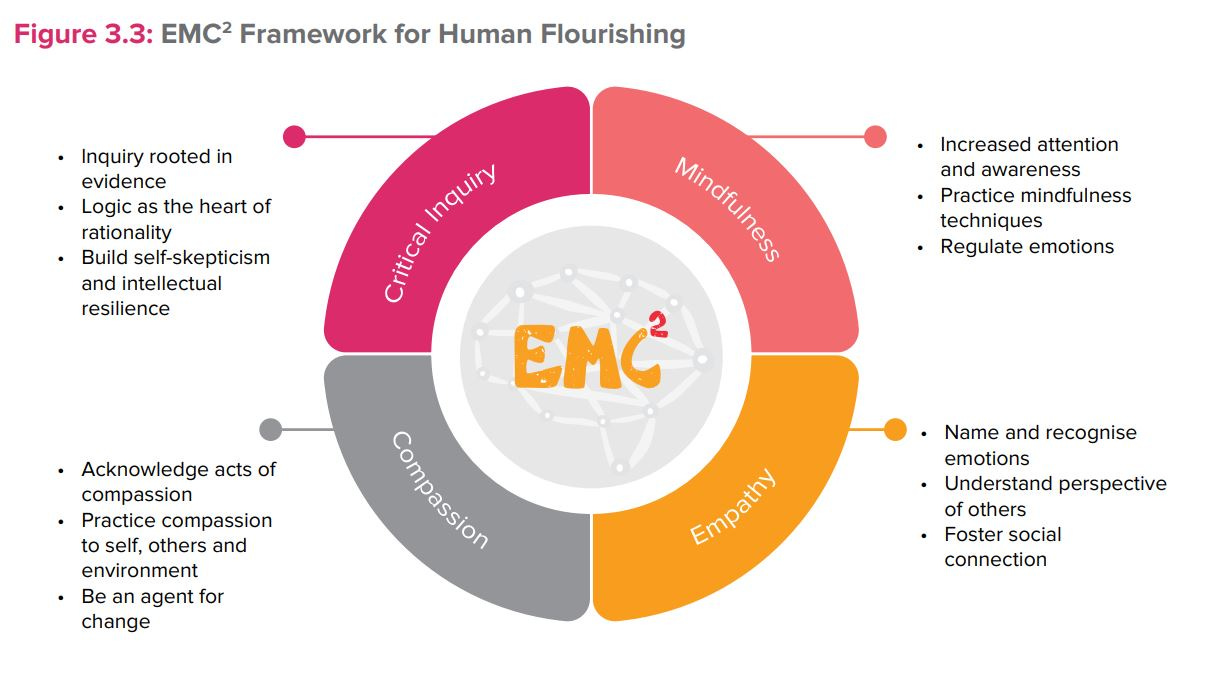
We can surmise that “build self-skepticism and intellectual resilience” really means instilling in the child an ability to believe the science™ dogma no matter what, and condition them to resist any opposing viewpoints. [This shall become more apparent in a later section we shall reference]. Within the above graphic’s ‘compassion’ tab, “be an agent for change” becomes self-evident as the activism and social justice rooted goal to indoctrinate the child as both true believers and contributors to Agenda 2030.
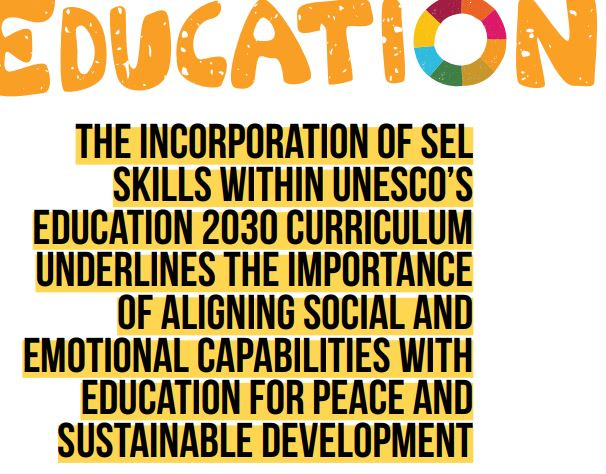
The propaganda ramps up by dissecting abstract graphs that serve as an opportunity to list neurolinguistic buzzwords to invoke certain connotations and drive ‘versus’ agendas:

It was interesting yet unsurprising to note the omnipresent tentacles of the Rockefellers cropping up:
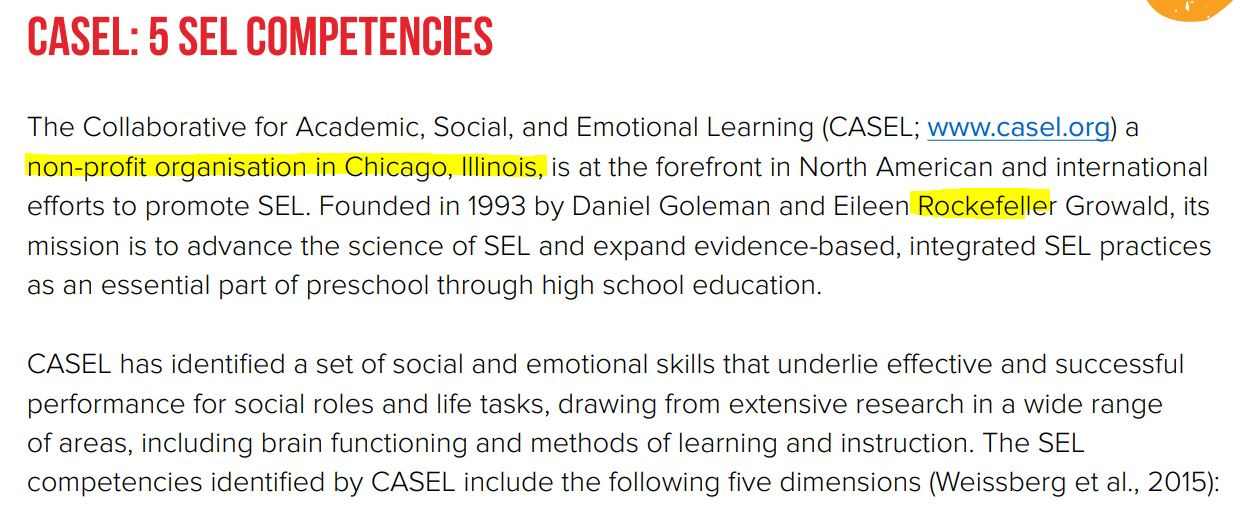
According to the CIA’s wikipedia:
Eileen Rockefeller (born February 26, 1952) is an American philanthropist. She is the youngest daughter of David Rockefeller and Margaret “Peggy” McGrath. Eileen is a member of the fourth generation of the Rockefeller family widely known as “the Cousins”.
👉For some fun facts on David Rockefeller, Sr., and the family background, head over to CorbettReport.
For the first time in the history of the human evolution, enough is known about human brain and behaviour to begin constructing neural networks for peace…the real focus of education should be on building human flourishing where individuals acquire competencies to achieve goals, manage emotions and exhibit prosocial behaviour.
“Constructing neural networks for peace” is reminiscent of WEF advisor Yuval Noah Harris’ infamous pronouncement that “humans are now hackable animals”.
What is “prosocial behaviour”? According to verywellmind.com, it is as follows:
Prosocial behavior refers to actions that are intended to help or benefit another person or group. These actions are characterized by a concern for the rights, feelings, and welfare of others. Prosocial behavior involves costs for the self and results in benefits for others. When prosocial behavior results in net benefits for both the beneficiary and the person committing the prosocial act, it is referred to as mutualism.
Whilst this sounds noble and altruistic – the real sense of this prosocial phrase per UNESCO’s educational policies, is again, to brainwash the individual (child) to be solely consumed with ‘benefitting’ others – by embracing Agenda 2030 and achieving the SDGs – ultimately at the expense of humanity’s freedom, leading to total subjugation and UN control over the global populace.
A recurring soundbite-driven-theme from the climate cultists, across their media darlings and captured legacy media platforms, is to attempt to shame the public for holding the view that economic growth is a net positive for humanity. This is subtly inserted later in this UNESCO report (emphasis added in bold):
The purpose of education thus far has been to build human capital for human well-being. Yet, there is increasing evidence that an emphasis on only GDP or material well-being leads to insecurity, poor interpersonal relationships and a consequent loss of a sense of community and shared collective goal attainment…
When confronted with dissonance, human beings align cognitions to facilitate the execution of actions that are not conflicting (Jones & Gerard, 1967). Thus, dissonance strains and challenges both rational decision-making and emotional capabilities that facilitate the attainment of the SDGs. This potential of dissonance to undermine development goals by enabling both compromise and inactions necessitates the need for appropriate dissonance management.
Given the emotional inclination of dissonance, its management requires emotional competencies. Here too, focused training in social and emotional competencies may facilitate dissonance management and attainment of the SDGs….prosocial behaviour aimed at improving another person’s welfare, in contrast to egoistically motivated action (Batson, 1998).
The underlying basis of human flourishing, in this case, is to facilitate the well-being of the self and of the other. We believe that this creates the need for a better understanding of the ‘other’.
The gist of this waffle is to impress upon the teachers absorbing the guidelines, that the child must be sufficiently programmed enough to stamp out any disbelief, dissonant questioning, or inner conflict, which may arise from their independent examination and inquiries as to the validity of the SDGs. The relentless references made to “emotional capabilities” amounts to the wholesale desire to emotionally blackmail the child into feeling immense guilt about climate change or the welfare of others – with their “rational decision-making” being based on the science dogma of the climate cult / DEI cult / Covid cult (all subsets of these cults are at the forefront of the social justice movements built into the 17 sustainable development goals).
The intended outcome for the child’s prioritised attention is consistently purported to be about the “other” (the collective), and not about the individual human being’s self-worth, their personal goals, or their actual emotional, cognitive, and social development – in the sense of being an inquisitive child, who is curious about the world and how they might learn and thrive (as opposed to being groomed to be an “agent of change” for Agenda 2030).
In a forthcoming article, we shall examine 2024 UNESCO literature which is much more overt and open in its aims to recruit the youth to be at the forefront of driving Agenda 2030, with so-called “Global Citizenship Education”, the use of digital tools in education, and the obsession with “hate speech” as a foundation for molding the youth into good compliant kids…
